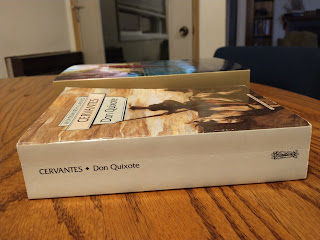The End and the Death volume 1 by Dan Abnett is a big book, both physically, and for its place in Warhammer fiction. As you can see in the photo I posted last week, the book is quite large, larger than my copy of Don Quixote. That puts it in the company of the collected works of Alister Mclean, The History of the Russian Revolution by Trotsky, and a history of the scramble for Africa. Books that big are actually a problem for me. I have big hands, and despite that, the book feels like it is too much book. Thicker paper and denser material for the hardcover. It reduces the enjoyment of reading the book when as I read it I can feel the balance changing. I like books that I can sink into and let all distractions fade away, and it is a little hard with The End and the Death volume 1.
It is not like this book couldn't have been shorter. I am writing this before even the release date for the second volume has been revealed, so I have no idea if all of the story beats will be incredibly relevant, but many of them feel superfluous. This is supposed to be the culmination of the epic tragedy that is the background to Warhammer 40,000, and for most of the book it focuses on that, and when it has that focus it is great, but the sections focused on Fafnir Rann, and the Dark Angels can just be edited out, and I think this story would be improved. The audience is here not for the fighting on the surface between Space Marines but on the understanding that this book sets up the duel between the Emperor and Horus for the fate of the galaxy. There is enough here for a good volume 1, you can just trim it down a bit.
Up until this point I have been really negative, and the book has its problems, but I really enjoyed reading it. Dan Abnett has proven again that he is an excellent author, and he really delivers. The author takes the problem that hopefully everyone reading this book knows what the outcome is, and uses it to build to something bigger. Language is repeated effectively because of how he describes the world. Characters use the same language again and again because reality is breaking down, and in this new reality, those words are the most natural thing. It is a very striking use of repetition, and it helps build and build and build until the revelation that what it is building towards in the next novel is bigger than I expected.
It is a good part 1, and a good example of what talented authors can do in tie-in fiction. The Warhammer 40k setting is not something that any of these authors made, but the Black Libary's best authors have shown that they can make great fiction out of it. The ratio of excellent fiction to action schlock is not as great as I would like, but a number of great books recently have me very excited for news about new releases.
I am worried about what people new to the setting should read. My first Warhammer novel was also by Dan Abnett, and it was a much better introduction than this one. Reading this as your first Warhammer 40k novel is like watching Avengers Infinity War as your first experience with superheroes. It makes it difficult to recommend without the reader first undergoing a course in Warhammer 40k history and metaphysics. I don't exactly have a reading list prepared for the class, as a lot of it comes from some very well-researched and decently-cited Reddit posts. Black Library is cranking out books and I don't have the time or money to read them all. If you are deep into Warhammer 40k I would recommend it, but if not I would not pick it up. You would be so lost your experience would be terrible.
Next time on the blog we look forward to the exciting world of wood heat. I don't want to give too much away, but I think it is going to be FIRE!





